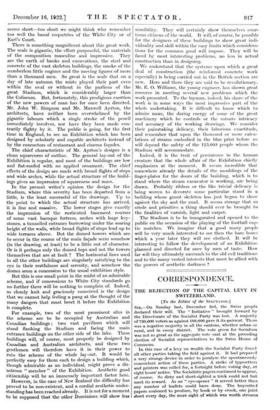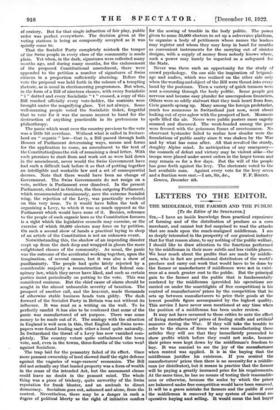CORRESPONDENCE.
THE REJECTION OF THE CAPITAL LEVY IN SWITZERLAND.
[To the Editor of the SPECTATOR.] SIR,—On Sunday last, December 3rd, the Swiss people declared their will. The " Initiative " brought forward by the Directorate of the Socialist Party was lost. A majority of 730,000 voters as against 109,000 gave it its quiescat. There was a negative majority in all the cantons, whether urban or rural, and in every district. The vote given for Socialism was not so great as the aggregate vote cast at the preceding election of Socialist representatives to the Swiss House of Commons.
In this case of a levy on wealth the Socialist Party found all other parties taking the field against it. It had prepared a very strange device in order to paralyse the spontaneously concordant action of these parties. A strike of typesetters and printers was called for, a fortnight before voting day, at eight hours' notice. The Socialistic papers continued to appear, of course. So dirty and short-sighted a trick could not but meet its reward. As an " eye-opener " it served better than any number of leaflets could have done. The boycotted papers coalesced to produce, by hook or by crook, one joint sheet every day, the mere sight of which was worth streams
ef oratory. But for that single infraction of fair play, public order was perfect everywhere. The decision given at the voting stations is being as composedly accepted as it was • quietly come to.
That the Socialist Party completely mistook the temper of the Swiss people in every class of the community is made
• plain. Yet when, in the dark, signatures were collected many months ago, and during many months, for the endorsement of the proposed Constitutional amendment, there were appended to the petition a number of signatures of Swiss citizens in a, proportion sufficiently alarming. Before the vote the proposal was held forth in the colours of a tempting rhetoric, as is usual in electioneering programmes. But when, in the form of a Bill of nineteen clauses, with every Socialistic " i " dotted and every Socialistic " t" crossed, a copy of this Bill reached officially every vote-holder, the contents were brought under the magnifying glass. Yet not always. Some well-meaning people voted the Socialistic ticket, forgetful that to vote for it was the means nearest to hand for the destruction of anything practicable in its pretensions to philanthropy.
The panic which went over the country previous to the vote was a little bit overdone. Without what is called in Switzer- land an " organic " law—that is, a Bill passed through both Houses of Parliament determining ways, means and forms for the application to come, an amendment to the text of • the Constitutiontruns the risk of remaining a dead letter. With such promises to start from and work out as were laid down in the amendment, never would the Swiss Government have had such a difficult task before it as that- of putting together an intelligible and workable law and a set of consequential decrees. Note that there would have been no change of Government. The Swiss Governments do not resign on a vote, neither is Parliament ever dissolved. In the present Parliament, elected in- October, the then outgoing Parliament, which recommended unanimously, save the extreme Socialist wing, the rejection of the Levy, was practically re-elected on this very issue. To it would have fallen the task of organizing a Levy, to which it was as much opposed as the Parliament which would have none of it. Besides, reference to the people of such organic laws as the Constitution foresees • is a right which the legislative councils may exercise, or the exercise of which 80,000 electors may force on by petition. On such a second show of hands a practical laying to sleep of an article of the Constitution is not an unknown event.
Notwithstanding this, the shadow of an impending disaster crept up from the dark deep and wrapped in gloom the more enlightened classes of the community. As usual, the panic was the outcome of the accidental working together, upon the imagination, of several causes, but it was also a show of .pusillanimity. The people had quite lately rejected by a considerable majority a reconstruction of the federal con- spiracy law, which they never have liked, and such as certain parties insist periodically on putting to the vote. This was considered ominous. But the chief cause of alarm should be sought in the almost unbearable severity of taxation. The prospect of another call, and the heaviest, made thousands of otherwise stable business heads tam giddy. The dash forward of the Socialist Party in Britain was not without its influence. It was -read as a writing on the wall. To be perfectly candid it has also to be confessed that some of the panic was manufactured of set purpose. There was some money to be made out of it. The analogy with the situation in England is well seen in this, that English and Swiss news- papers were found lending each other a hand quite naturally. In Switzerland the threat of a Levy has now vanished com- pletely. The country voters quite outbalanced the town vote, and, even in the towns, three-fourths of the votes went against Socialism.
The trap laid for the peasantry failed of its effect. Once more peasant ownership of land showed itself the right defence against the vagaries of wage-earners' economics. The Bill did not actually say that landed property was a form of wealth in the sense of the intended Act, but the assessment clause could leave no doubt in the peasant mind. The whole thing was a piece of trickery, quite unworthy of the Swiss reputation for frank Muster, and an ambush to direct democracy. Socialism goes out, ashamed and alone, from the contest. Nevertheless, there may be a danger in such a degree of political liberty as the right of initiative confers for the sowing of trouble in the body politic. The power given to some 50,000 electors to set up a subversive platform, to organize a body of petitioners whose names the leaders may register and whom they may keep in hand for months as convenient instruments for the carrying out of sinister designs, with a supply of money from nobody knows where, such a power may barely be regarded as a safeguard for the State.
Never was there such an opportunity for the study of crowd psychology. On one side the inspiration of brigand- age and malice, which was realized on the other side only when the wording and object of the Bill were thrust into every hand by the postman. Then a variety of quick tremors were sent a-coursing through the body politic. Some people got nervous and became easy plunder for unscrupulous financiers. Others were so oddly stalwart that they took heart from fear. Civic guards sprang up. Many among the foreign proletariat, much too numerous in Switzerland just now, went about looking out of eyes aglow with the prospect of loot. Mesmeric spells filled the air. Never were public posters more eagerly scanned and discussed. The weak-headed among the poor were fevered with the poisonous fumes of covetousness. No observant bystander failed to realize how slender were the foundations of public sanity since it was shaken by the War and by what has come after. All that revolted the sturdy, doughty Alpine mind. In anticipation of any emergency— the counsels, of defeat and victory may be violent alike—the troops were placed under secret orders in the larger towns and may remain so for a few days. But the will of the people has gone forth against the levy. The electorate voted to the last available man. Against every vote for the levy seven and a fraction were cast.—I am, Sir, eze., F. F. Roorr. Geneva, December 4th.















































 Previous page
Previous page